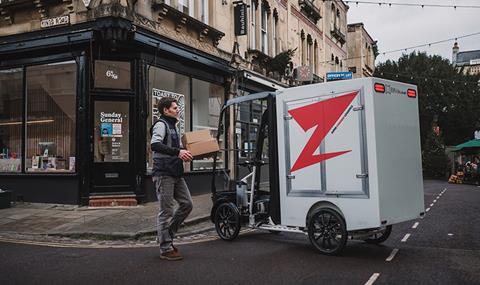
Zero-emission operator Zedify has been awarded a £100,000 grant as part of Bristol City Council’s strategy to ensure 95% of deliveries within its central area are made by electric vehicles within 10 years.
Funding is from Bristol’s Go Ultra Low West, a £7m transport project that will provide infrastructure for large-scale conversion to electric and ultra-low emission vehicles in the West of England.
The grant will help support a new Zedify micro-consolidation hub that will be centrally located and allow HGVs and diesel vans bringing goods into Bristol to drop off their goods without entering the city centre.
Zedify’s model consolidates inbound packages with local deliveries, and each route is then completed on a cargo bike or trike carrying up to 100 packages or 200kg. It also runs a fleet of electric vans for heavier, bulkier items or to act as mobile warehouses.
Councillor Kye Dudd, cabinet member with responsibility for transport, said: “Removing polluting vehicles from our city centre is vital to help us tackle the issue of air quality in Bristol.
“We want to continue to reduce the number of heavy goods vehicles entering the city and encourage onward journeys to be done by zero-emission vehicles. This will help us improve air quality and contribute to our goal of becoming carbon neutral by 2030.
“Freight consolidation is a way of removing freight vehicles from our roads. It helps reduce the negative impacts associated with heavy traffic which are often experienced most by people living in areas of deprivation."
Zedify Bristol’s MD Simon Whitehead said: “With online retail booming, having grown by around 70% in 2020, the logistics sector has been brought into the spotlight.
"At Zedify we are proud to be shaking things up, not only through our green delivery model but also by paying all our staff a real Living Wage. Bristol businesses now have a truly ethical, sustainable and cost effective option for sending and receiving packages.”
Zedify Bristol’s new depot is part of a national urban network, with nine other micro-consolidation hubs across the country.













![DP World Modal Shift Programme Image[72690]](https://d2cohhpa0jt4tw.cloudfront.net/Pictures/100x67/4/9/7/17497_dpworldmodalshiftprogrammeimage72690_781836.jpg)
